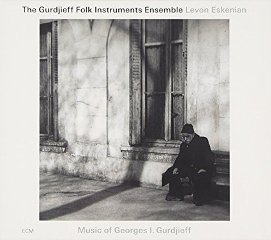Georges I. Gurdjieff - Music Of Georges I. Gurdjieff (2011)
Georges I. Gurdjieff - Music Of Georges I. Gurdjieff (2011)

1. Chant from a holy book (3 duduk,oud) 2. Kurd shepherd melody(blul, saz) 3. Prayer(kanon) 4. Sayyid Chant and dance No. 10 (2oud, kanon, blul, dap) 5. Sayyid chant and dance No. 29(oud, kanon, blul, dap) 6. Armenian song (duduk, santur, tar, kamancha, kanon, oud, dap) 7. Bayaty(oud, kanon, kamancha, blul, dap) 8. Sayyid chant and dance No. 9 (oud, kanon, blul, dap) 9. No. 11 from "Asian songs and rhythms" (tar, santur, oud, dap, zarb) 10. Caucasian dance (duduk, kamancha, tar, santur, kanon, oud, dhol) 11. No. 40 from "Asian songs and rhythms" (duduk, kamancha, tar, santur, kanon, oud, dap) 12. Trinity (tar, santur, dap) 13. Assyrian women mourners (4 duduk, dap) 14. Atarnakh, kurd song (blul, kamancha, tar, santur, kanon, saz, oud, dap) 15. Arabian dance (2 oud, kanon, dap) 16. Ancient Greek dance (santur, kanon, oud, dap) 17. Duduki (3 duduk, oud, dap) Gurdjieff Folk Instrument Ensemble Levon Eskenian – conductor
"What appeals most to me in Levon Eskenian's instrumentation is the extremely meticulous, clear cut work approach without unnecessary `composing' and `cleverness' - when in the wilderness of silence the tiniest intervention is done with sound, which is very characteristic of Gurdjieff's works. There is deep silence at the core of Gurdjieff's music that relates us to the Ecclesiastes chapter of the Bible, or to the truth told of deep silences from faraway lands, a stillness that has not been darkened at all, and has the degree of density that leaves the Gurdjieffian silence immaculate." -- -Tigran Mansurian, amazon.com
Armenian writer and philosopher Georges I. Gurdjieff was not trained as a composer, but he had a wealth of musical ideas based on folk traditions of Armenia and other Near and Middle Eastern cultures. His disciple Thomas de Hartmann was a pianist and composer, and Gurdjieff dictated over 300 melodies to him, which he arranged for piano, and which have become relatively widely known thanks to the advocacy of pianists like Keith Jarrett, Cecil Lytle, and Alain Kremski. On this ECM album, Levon Eskenian takes Gurdjieff's music a step closer to its roots by arranging the piano pieces for the kinds of instruments and folk ensembles the composer would have been most familiar with. The results sound remarkably like folk music of the regions in which Gurdjieff lived and traveled. Some of the instruments Eskenian uses in the Gurdjieff Folk Instruments Ensemble may be familiar to Western listeners with an interest in Eastern music, but some are likely to be exotic to all but specialists and committed fans. The string, wind, and percussion instruments produce a rich variety of timbres and Eskenian combines them with insight and ingenuity to produce a broad spectrum of moods. The modal pieces, many of which have a gently elegiac or meditative quality, are related to a number folk traditions, and in his helpful program notes, Eskenian describes the cultural influences behind each piece. ECM's sound is immaculate, warmly atmospheric, and immediate. --- Stephen Eddins, Rovi
download (mp3 @320 kbs):
yandex 4shared mega mediafire cloudmailru uplea ge.tt








